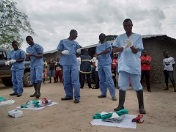
The Sierra Leone Red Cross Society, with support from the International Federation of Red Cross and Red Crescent Societies (IFRC), has launched the expansion of its Ebola operations in Sierra Leone with a three-day workshop.
(Photo: Red Cross volunteers and employees preparing to retrieve the body of a 28-year-old woman who allegedly died from Ebola in the village of Lalehu in the Kailahun district.)
Designed to train newly recruited staff responding exclusively to the Ebola crisis, the workshop will see Red Cross activities expand from one district to six. This positions the Red Cross, and its country-wide network of volunteers, 1,600 of whom have already been mobilized to respond to the outbreak, to address the most urgent needs of communities in an effective and coordinated approach.
One of the most striking factors of the newly recruited staff is their long-standing engagement with the Sierra Leone Red Cross Society. Many of the workshop participants had been volunteers during the cholera outbreak in 2012, in which the National Society played a vital role in the containment of the disease.
Two years later, they are once again ready to step up, this time to help defeat Ebola in their communities. When asked why they chose to join the fight against Ebola, the simple answer is “If I don’t do it, who will?” Their motivation is to protect their family, friends and communities.
Preparing staff is key
The three-day workshop in Sierra Leone focused on how to detect the signs and symptoms of Ebola, prevention strategies, tools for community mobilization, as well as providing a space for participants to ask questions and share their concerns. The Red Cross underlines the importance of adequately preparing its staff to undertake their various roles.
As of October 21, 2014, Sierra Leone has witnessed a total of 3,198 confirmed cases of Ebola, of which 1,173 have proven fatal. The number of casualties is virtually doubling on a weekly basis. With Sierra Leonean healthcare services stretched beyond their capacity, and a population living in a climate of fear, the Red Cross’ ability to respond is imperative. “Dedication and persistence is needed to confront this desperate situation,” states Constant H Kargbo, Acting Secretary General of the Sierra Leone Red Cross Society.
Through the generous support of UKAID, ECHO, USAID, the Canadian Government, the Canadian Red Cross, partnering National Societies, and other donors, the Red Cross is now able to roll out expanded activities and help contain the effects of the Ebola virus in many more communities in Sierra Leone as well as in the capital of Freetown.
The response centers around a five pillar structure: contact tracing, safe and dignified burials, psychosocial support, an Ebola treatment centre in Kenema, and social mobilization. Given that Ebola is transmitted through direct contact with the body fluids of an infected person, “the only way to break the chain of transmission is to engage communities and thereby change people’s minds and behaviours,” says Dr. Lauralee Morris, a Canadian Red Cross doctor who has just returned from a deployment in Sierra Leone.
The Red Cross strategy capitalizes on experience gained from the existing operation in Kailahun district, particularly safe and dignified burial; a high-risk and sensitive activity.
“The first time I prepared a dead body for burial, I was scared. Now, after training with the doctors in Kailahun, I feel more confident and see that people around me have confidence in the Red Cross teams,” says Daniel James, national coordinator for the Red Cross team responsible for safe and dignified burials.. “We are now prepared to confidently expand to the new areas. I understand the importance of coordination in an emergency situation and the need to act with one voice. It is with this voice that we will kick Ebola out of Sierra Leone.”
Canadians who wish to support Red Cross efforts can make a donation to the Canadian Red Cross West Africa Ebola Fund.
By Lisa Pattison, IFRC. First published on the IFRC website.
Photo: Aapo Huhta, Finnish Red Cross